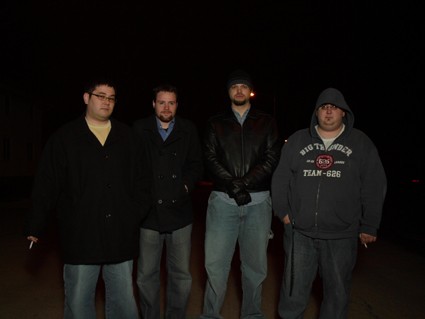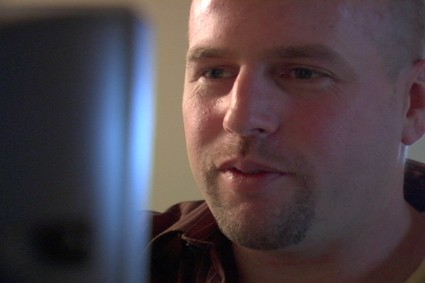One thing that's difficult to judge is the kind of audience
Second Skin
is geared toward. On the one hand, most of the information and
statistics highlighted in the film probably won't come as much of a
shock to gamers, especially MMO players, like how there are over 60
million people worldwide that play MMORPG's. On the other hand, the
documentary starts off with a vibe that might creep out people who
aren't knowledgeable about gaming culture, like using a quote from
author
Edward Castronova
about how these electronic realms will be one day preferred to earth,
thereby reinforcing the stereotype that gamers are social outcasts that
can't deal with reality. Additionally, superimposing graphics from
games onto real-life footage can come off as a little cheesy at times.
Finally, when it comes right down to it, the documentary is all about a
group of people that spend hours sitting in front of a computer screen.
Who isn't already familiar with that? Yet, as the film progresses, it
transforms into a fascinating account of the human experience where
virtual reality bleeds into real-life.
The most prominent story in Second Skin centers on group of four
friends (Andy, Matt, Chris, and Anthony) who balance their daily lives
with playing
World of Warcraft.
Andy actually moved from California to Indiana to be closer to his
online friends, where he met his wife and is expecting twins.
WoW is
an integral part of Andy's life, and he's lucky enough to have a wife
who actually prepares his character for a raid before he gets home from
work so he can jump right in. The film goes on to document how the
responsibilities of real life gradually impact a friendship that's
largely built around the love of the game. At one point, the group goes
through a five day gaming marathon when The Burning Crusade expansion
releases, but priorities gradually shift as Andy's twins are born and
Anthony gets married. In a second story,
Second Skin follows the budding romance between Heather and Kevin, who meet in
EverQuest 2
and develop a real-life relationship. They have to figure out whether
living together offline is as fulfilling as adventuring in the game
world. The last story involves Dan, who loses everything including his
friends, girlfriend and business while playing
World of Warcraft. He eventually seeks help, but in doing so, he makes it both the most uplifting and infuriating story of the three.
Although these three are the most prominent stories,
Second Skin
has a tendency to go far off into different directions in its attempt
to fully capture the MMO gaming culture. The film does an excellent job
documenting how games profoundly impact the lives of its players, but
does not adequately answer the question it presents at the beginning:
Is MMO gaming an isolating experience or is it bringing people together
in a new way?
Second Skin
takes the position that video games are different things to different
people, which really isn't much of a revelation.
Segments such as the
spotlight on The Syndicate, an international gaming clan so big new
members require a referral along with submitting an application and
resume for admittance, seems awkwardly inserted and includes a lot of
fast cuts jumping from one member to another. There would seem to be
alot of great content surrounding this group that could have been explored
in more detail. The concept of a global online community with ties to developers and
strategy guides isn't taken very far, but the quotes from couples who
met online concerning their interpersonal relationships come in handy
when covering Heather and Kevin's romance. Similarly, the interview
with the gold farming company touches upon how racism translates into
the virtual world, but never fully engages the issue. Gold farmers, the
majority of whom happen to be Chinese, are "exposed" by testing their
proficiency with English. Yet the topic of how issues like racism creep
into the virtual world, where everyone starts as equals and aren't
judged by looks or nationality, is quickly dropped. Furthermore,
Second Skin
doesn't elaborate on how gold farming ruins the gaming experience for
others. Viewers simply have to take the player's word for it, even
though the film points out that China is simply using its vast labor
resources to fill a huge consumer demand in the US for virtual goods.
Although it's clear that
Second Skin
seeks to document an American experience in dealing with online games,
it seems very neglectful that South Korea, a country where online games
have been fully integrated into the culture, isn't mentioned at all -
not even in the DVD's bonus materials. The film spends so much time
leaping from topic to topic that we were shocked at such a large
omission.
The most upsetting aspect of
Second Skin concerns Dan, a recovering game addict in Philadelphia who loses everything to playing
WoW and
contemplates suicide, but seeks help through Online Games Anonymous.
The support group is founded by a woman named Liz Woolly, whose only
qualifying credentials are that she went through AA herself once and
that her son committed suicide after being addicted to online games.
Her solution is to simply substitute references to drugs and alcohol in
the 12 step program with gaming, and she is fully satisfied with how
well it fits. Nevermind the fact that pretty much anything can fit into
a 12 step program, but it quickly becomes clear that Woolly is in no
position to help anyone. She later laments about the ingratitude of
addicts and recounts the events leading up to her son's suicide. In
recounting, she admits that she forced her son into therapy but drops
the original therapist because she didn't agree with his assessment
that gaming wasn't causing her son's condition. Afterwards, her son is
diagnosed with "depression and schizoid behavior," with a definition
she states is, "like describing a computer nerd." Way to be
nonjudgmental. As tragic as her son's death is, would it have hurt to
get an opinion from an actual professional? Meanwhile, Kimberly Young,
a PhD and Director for Internet Addiction and Recovery, gets about five
seconds of screen time to say that gaming widows do in fact exist.
Ultimately, Woolly's role seems fairly insignificant, since Dan leaves
her so-called support group, relapses for a period, and then pulls out
of the addiction using his own will, self-realization and
determination.
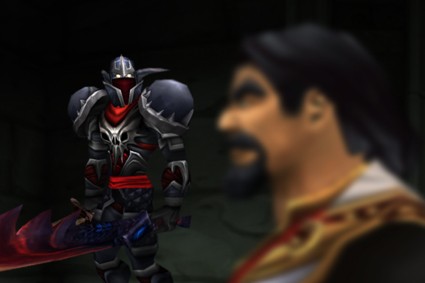
Gamers will probably see a bit of themselves with each story, and
practically all will agree with Andy's assertion about how gaming is no
different than hanging out at a bar or sitting at home watching sports.
Documenting a tight-knit group of friends who must balance the demands
of real-life with their gaming time is a fascinating topic, but the
same story could be told about almost any hobby. Andy and his friends
remind us of every gamer, and the relationships they have with their
spouses are ones that many would wish for themselves. This keeps things
entertaining, but we still have to wonder what audience this film is
intended for. Grappling with gaming addiction could have been a
documentary in itself, but other than that, the film doesn't offer
long-time gamers much that they probably don't already know. Since
there are an increasing number of couples meeting through online dating
services, the concept of people forming a relationship within a game
where there's frequent interaction becomes less remarkable. However, we
will admit that overcoming the "1 female player for every 5 males"
ratio is quite a feat and moving across states to be with the other
person demonstrates a great commitment.
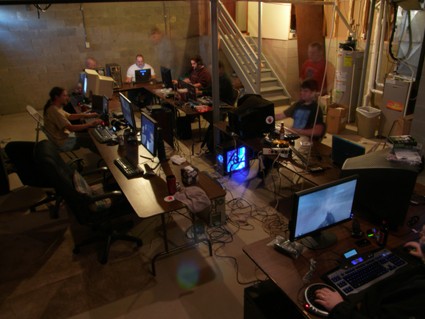
The idea of whether a virtual persona represents a person's "real"
personality more so that true life does is initially treated as a
central theme, but the film mainly follows these individuals while
they're out of game and doesn't document their behavior online, so a
comparison is impossible. There's a scene where Kevin states that being
a better person in virtual life translates into real-life courage, but
he and Heather later admit that they still have a lot to learn about
each other after months of living (and presumably gaming) together,
which exposes the limitations of online interaction. As far as we see,
these are generally nice, outgoing people both on and offline. Even in
Dan's case, the game didn't necessarily bring out a hidden aspect of
his personality or play out a wish fulfillment fantasy, but capitalized
on a drive that was already there when he started his first business.
Specifically, the satisfaction derived from starting with nothing and
working to become the best at something. Once he redirects that drive
from virtual life to real-life, he gets things back on track.
To a gamer,
Second Skin
works to further justify the lifestyle and reinforces what they already
know or suspect. The average person who already has a preconceived
notion of what gaming is all about probably won't be swayed one way or
another. A layperson might walk away from the film with a better
understanding of why players find MMO's so appealing, but
Second Skin's
draw is in seeing how video games are making a significant impact on
people's daily lives, and we not just talking about those in the 18-24
year old demographic. These are adults, some of whom are in their 30's,
and consider gaming to be a critical aspect of their lives. Again, the
film has a tendency to wander in all different directions and doesn't
fully examine its key themes, but it is nonetheless fun to watch,
preferably with mix of gamer and non-gamer friends.
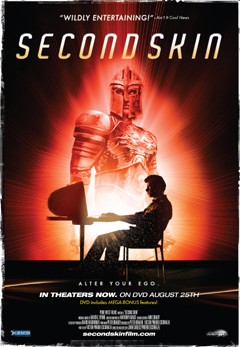 Title: Second Skin
Title: Second Skin
